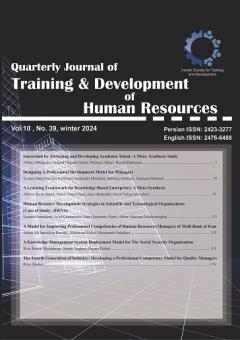The purpose of the current research is validation of the human resources development model based on the statement of the second step of the revolution. Accordingly, a mixed research approach has been used. The research community in the qualitative part consists of exper
More
The purpose of the current research is validation of the human resources development model based on the statement of the second step of the revolution. Accordingly, a mixed research approach has been used. The research community in the qualitative part consists of experts and specialists in the field of human resources development and the statement of the second step of the revolution. 15 people were interviewed based on the information saturation of the researcher. In the quantitative part of the research, there were employees of the human resources department of the ministries, 372 people were selected through random stratified sampling, and the research questionnaire was implemented. The analysis of the collected data was done in the qualitative part with the qualitative content analysis method, and in the quantitative part, it was done by descriptive and inferential methods using SPSS and Smart PLS software. According to the qualitative research findings, 3 basic dimensions (individual, organization, society) were identified, and these 3 dimensions had 16 components. Also, 61 sub-components or conceptual codes were identified under these components. Also, examining the quantitative method for fitting the model was an indication of the appropriate fitting of the model. Based on the findings of the research, it is necessary to coordinate the policies of human resources development with the policies of the country, including the policies presented in the statement of the second step of the revolution, and it will lead to the realization of the goals of human resources development.
Manuscript profile


